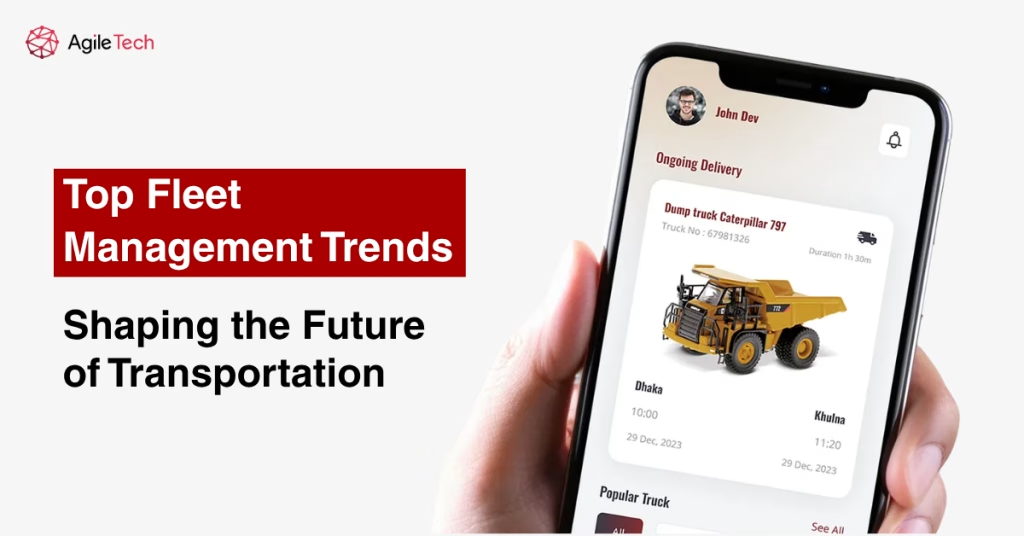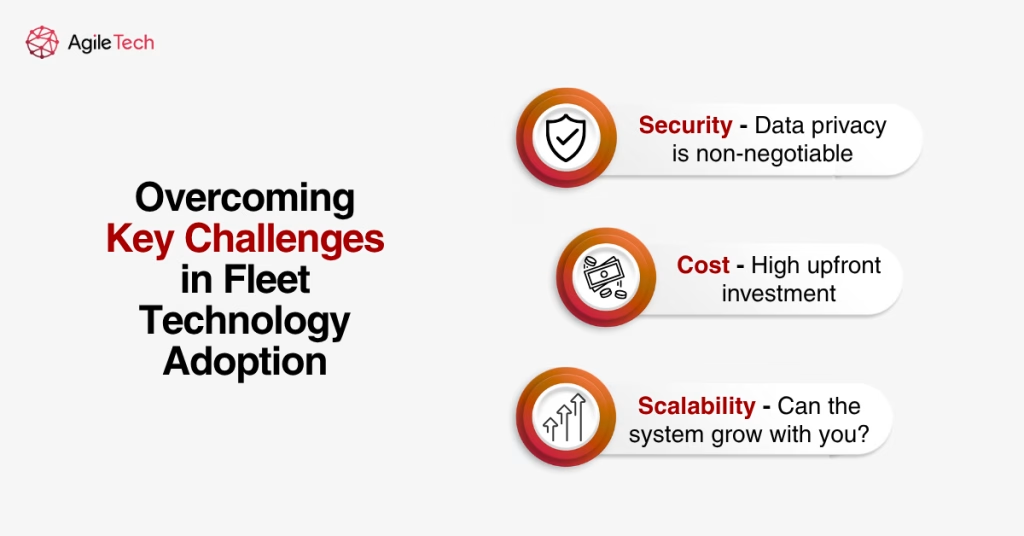Top Fleet Management Trends Shaping the Future of Transportation
Fleet management is no longer a behind-the-scenes function. In today’s dynamic transportation landscape, it plays a central role in ensuring operational efficiency, compliance, sustainability, and cost-effectiveness. As businesses scale and mobility needs evolve, staying updated on the latest fleet management trends becomes crucial for any company managing vehicles, from logistics firms to ride-hailing services.
This article explores in depth the key fleet management trends that are transforming the industry, from the adoption of AI in telematics to the growing importance of green fleets and the rise of mobility-as-a-service. We also examine how fleet management systems are evolving with these trends, enabling businesses to future-proof their operations and stay competitive.

- 1. What Is Fleet Management and Why Does It Matter
- 2. Overview of the Global Fleet Management Market
- 3. Key Fleet Management Trends to Watch
- 4. Emerging Technologies Shaping Fleet Management Systems
- 5. Challenges and Considerations for Adopting New Fleet Technologies
- 7. AgileTech’s Role in the Fleet Management Ecosystem
- Conclusion
1. What Is Fleet Management and Why Does It Matter
Fleet management refers to the practices and systems used to oversee, coordinate, and optimize a company’s vehicle fleet. A fleet can include delivery vans, trucks, buses, taxis, or even company cars. Effective fleet management is essential for reducing costs, maximizing vehicle uptime, ensuring driver safety, and meeting regulatory requirements.
A fleet management system typically includes a combination of software, hardware (such as GPS devices), and analytics tools that help companies track vehicle location, fuel usage, maintenance needs, and driver behavior. With the increasing availability of real-time data and automation tools, fleet managers today can make faster and smarter decisions than ever before.
2. Overview of the Global Fleet Management Market
According to recent industry reports, the global fleet management software market is experiencing exponential growth. Valued at around USD 23.69 billion in 2023, it is expected to reach over USD 116 billion by 2032. This growth is being driven by the widespread digitalization of transportation and the rising demand for data-driven decision-making in fleet operations.
This surge reflects a broader shift in business priorities: companies are now seeking intelligent, connected solutions that provide end-to-end visibility into their fleet performance. As a result, modern fleet management systems are no longer optional; they are a critical investment for forward-thinking organizations.
Read more: Fleet Management Software Development: Development, Challenges, and Tech Stack
3. Key Fleet Management Trends to Watch
3.1. AI-Powered Telematics and Predictive Insights
One of the most impactful fleet management trends is the integration of artificial intelligence into telematics platforms. Modern systems use machine learning algorithms to analyze vast data sets and deliver actionable insights in real-time.
Context-aware models detect unusual driving patterns or mechanical issues early, helping fleet managers take preventive action. Virtual assistants simplify data interpretation, offering maintenance recommendations directly from analytics. Image-based AI tools also automate damage detection using real-time photos or video.
These technologies reduce human error, increase safety, and lead to smarter fleet management decisions.
3.2. Sustainability and Green Fleet Management
Sustainability is now a business imperative. Companies are under pressure to reduce emissions and comply with environmental standards, and fleet management systems help meet these goals.
They monitor electric vehicle battery health, charging patterns, and energy efficiency to support EV adoption. Eco-driving features flag aggressive driving and coach drivers on fuel-saving habits. Carbon tracking dashboards measure and report emissions, allowing firms to meet green targets.
By adopting green fleet strategies, companies can lower fuel costs, enhance brand reputation, and reduce their environmental impact.
3.3. Expansion of 5G in Fleet Communications
The rollout of 5G networks is transforming how fleets communicate and share data. With faster speeds and lower latency, 5G expands what’s possible for fleet systems.
Autonomous vehicles rely on instant data transmission for safety and navigation, which 5G supports. Real-time diagnostics deliver live vehicle health updates and alerts to operators. Logistics networks also benefit through integration with smart infrastructure and IoT platforms.
Fleet management systems will increasingly rely on 5G to deliver real-time precision, boosting responsiveness and operational control.
3.4. Data-Driven Optimization with Telematics & GPS
Telematics has become essential for modern fleet operations. By combining GPS and vehicle diagnostics, managers gain unmatched visibility into how fleets perform.
They can dispatch vehicles more efficiently through real-time routing. Early maintenance warnings help prevent breakdowns. Route analytics also supports fuel-saving strategies, improving both costs and sustainability.
The ability to monitor vehicles in real time and use that data to fine-tune operations is a trend that will only become more vital as fleets grow in size and complexity.
3.5. Rise of Mobility-as-a-Service (MaaS)
MaaS is changing how transportation is planned and delivered. It combines various transport modes into one seamless experience, benefiting both users and providers.
Fleet managers can allocate vehicles on demand based on real-time demand. Systems integrate with transit or rideshare apps, enhancing efficiency. Centralized scheduling and billing streamline operations for both passengers and dispatchers.
Fleet management systems that can support MaaS integration will be essential as consumers and businesses demand more flexible and personalized mobility solutions.
4. Emerging Technologies Shaping Fleet Management Systems
The software powering fleet management is undergoing a quiet but revolutionary shift, driven by technologies once considered futuristic. These tools are not just extensions; they are reshaping how systems are designed, deployed, and adapted.
4.1. Blockchain for Fleet Data Integrity
Blockchain is bringing greater transparency and trust to fleet software architecture. Each transaction from maintenance records to fuel purchases can be logged on an immutable ledger, making auditing easier and eliminating data disputes. This approach ensures the integrity of records and opens doors to real-time verification across service vendors.
4.2. Augmented Reality (AR) for Technical Support
Fleet management software can now integrate with AR interfaces to guide maintenance teams in the field. Imagine a technician scanning a vehicle’s engine with their phone and receiving interactive repair overlays. These tools not only reduce training time but also improve accuracy and speed when diagnosing issues.
4.3. Digital Twins for Predictive Simulation
Digital twin technology allows software to simulate the behavior of every asset in a virtual environment. For fleet managers, this means seeing how a vehicle might perform under new routes, seasonal conditions, or after hardware upgrades all without deploying a single tire. The result is smarter planning and fewer surprises.
4.4. Edge Computing for Real-Time Processing
As fleets become more connected, relying solely on the cloud creates latency. Edge computing solves this by bringing data processing closer to the source, right in the vehicle. This allows immediate feedback loops for driver alerts, condition-based maintenance, or hazard detection, all handled locally by onboard software.
4.5. Low-Code Platforms for Rapid Deployment
Many fleet operators want to build custom solutions but lack full engineering teams. Low-code software platforms enable the quick development of internal dashboards, alert systems, and integration modules. This democratizes innovation and helps smaller businesses stay agile in a fast-changing environment.
These technologies aren’t just buzzwords; they’re actively redefining how software supports fleet intelligence, reliability, and scale.
5. Challenges and Considerations for Adopting New Fleet Technologies
While the benefits of advanced fleet management systems are significant, implementation does come with challenges. Here are key considerations:

5.1. Upfront Investment and Resource Allocation
Deploying modern fleet technologies often involves high initial costs for hardware, software, and employee training. Businesses must weigh these costs against long-term savings and operational efficiency.
5.2. Data Privacy and Cybersecurity
With telematics and real-time GPS tracking, fleets generate massive volumes of sensitive data. Companies must enforce robust cybersecurity protocols and comply with data protection regulations to maintain customer and driver trust.
5.3. Scalability and Future-Proofing
Fleet management solutions must grow with the organization. Systems that lack scalability may become obsolete as the fleet expands, so it’s crucial to select platforms that can accommodate growth and adapt to future technologies.
Understanding these barriers helps organizations plan strategically and choose solutions that align with long-term goals.
7. AgileTech’s Role in the Fleet Management Ecosystem
AgileTech works with transportation companies and logistics providers to develop customized fleet management solutions tailored to their unique needs. With experience in AI, cloud infrastructure, and IoT integration, our team helps businesses modernize their fleet operations without compromising flexibility or security.
From building intuitive dashboards to implementing predictive maintenance tools, AgileTech’s solutions are designed to scale and evolve with your business. We prioritize transparency, scalability, and real-world usability in every solution we deliver.
Conclusion
Fleet management trends are evolving rapidly, driven by innovation and shifting global demands. Companies that proactively invest in modern fleet management systems will enjoy advantages in cost control, safety, customer service, and environmental compliance.
By understanding these trends and partnering with experts like AgileTech, businesses can transform their fleet into a source of competitive advantage and long-term growth.